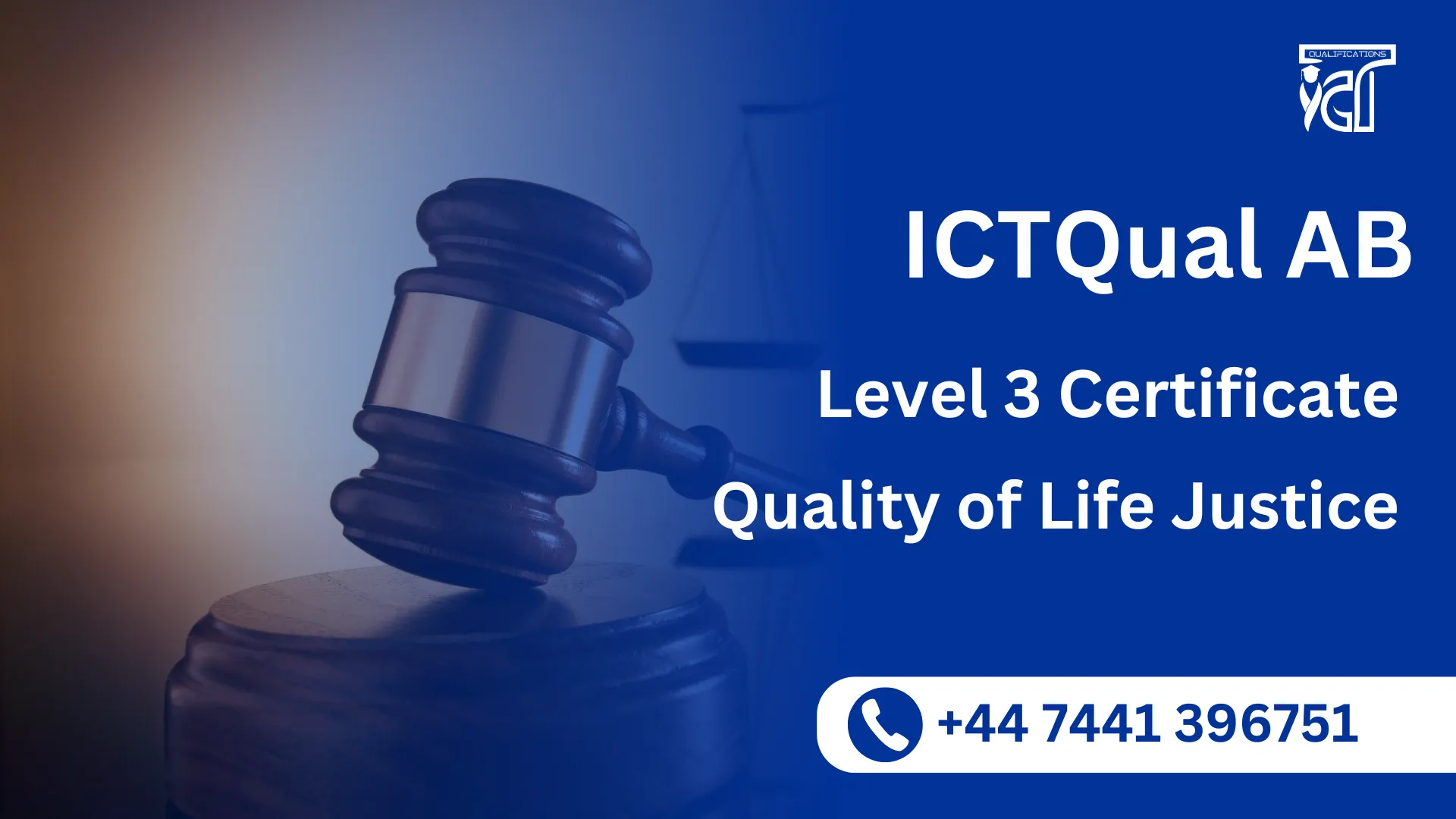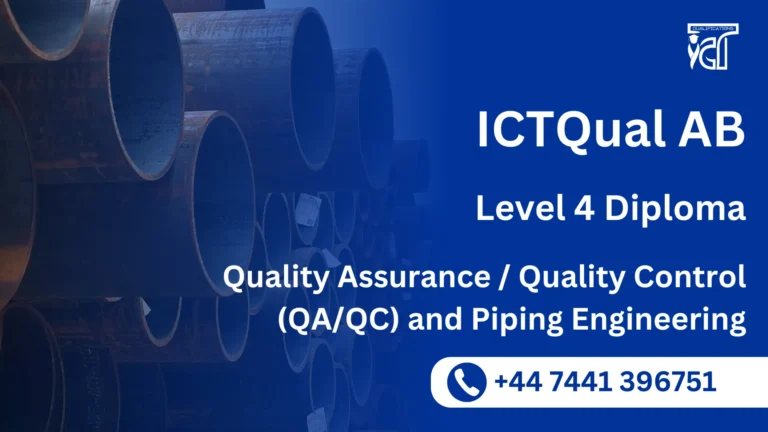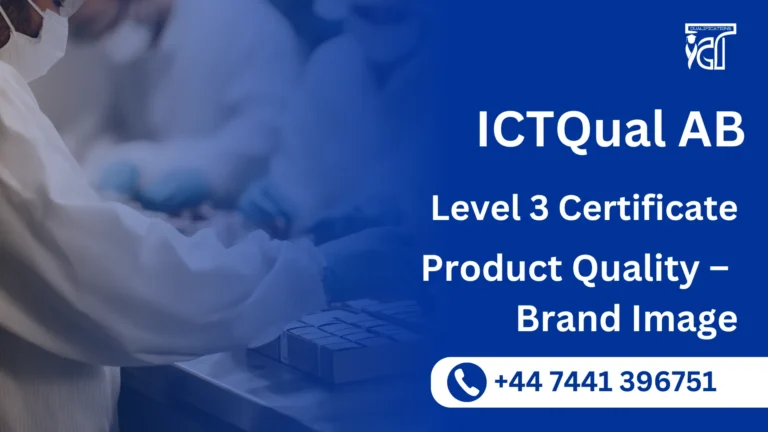The ICTQual AB Level 3 Certificate in Quality of Life – Justice is designed to explore the essential role of justice in shaping fair, inclusive, and sustainable societies. Justice is not only a legal principle but also a cornerstone of human dignity, equality, and social stability. This course provides learners with a structured understanding of how justice contributes to quality of life, examining its impact on individuals, communities, and institutions.
Learners will study the foundations of justice, including fairness, rights, responsibilities, and the rule of law. The program emphasizes both theoretical perspectives and practical applications, enabling participants to analyze how justice systems influence social equity and community well-being. Through case studies and real-world examples, learners will gain insights into how justice promotes trust, accountability, and resilience in society.
A distinctive feature of this course is its focus on the intersection between justice and everyday life. Participants will explore how access to justice affects education, health, employment, and social inclusion. The curriculum also highlights challenges such as inequality, discrimination, and barriers to justice, while encouraging learners to consider solutions that foster fairness and empowerment. This holistic approach ensures that learners appreciate justice not only as a legal framework but as a vital determinant of life quality.
Ultimately, the course prepares learners to contribute meaningfully to justice-related initiatives, whether in policy, advocacy, or community development. It is suitable for individuals seeking to enter or progress within fields such as law, social services, governance, or human rights. By the end of the program, participants will have developed both the knowledge and the professional mindset required to evaluate justice systems and advocate for improvements that enhance the lives of individuals and communities.
ICTQual AB Level 3 Certificate in Quality of Life – Justice
This qualification, the ICTQual AB Level 3 Certificate in Quality of Life – Justice, consists of 3 mandatory units.
| Sr# | Unit Title |
| 1 | Foundations of Justice and Quality of Life |
| 2 | Human Rights, Equality, and Social Wellbeing |
| 3 | Justice Systems, Policy, and Community Development |
Learning Outcomes for the ICTQual AB Level 3 Certificate in Quality of Life – Justice:
Foundations of Justice and Quality of Life
By the end of this unit, learners will be able to:
- Define justice as a multidimensional concept and explain its relationship to quality of life.
- Analyse how fairness, equity, and access to justice contribute to social stability and wellbeing.
- Identify the role of justice in protecting dignity, rights, and community cohesion.
- Evaluate cultural and historical perspectives on justice and their influence on societies.
- Demonstrate understanding of the ethical foundations of justice in personal and community contexts.
- Reflect on personal values and experiences in relation to fairness and justice.
- Apply theoretical frameworks to assess the impact of justice on human development.
- Compare different models of justice (e.g., restorative, distributive, procedural) and their relevance to quality of life.
Human Rights, Equality, and Social Wellbeing
By the end of this unit, learners will be able to:
- Explain the principles of human rights and their role in promoting equality and wellbeing.
- Analyse how discrimination, inequality, and exclusion undermine justice and social cohesion.
- Evaluate the importance of equal access to legal protection, education, and opportunities.
- Demonstrate understanding of international human rights frameworks (e.g., UN Declaration of Human Rights).
- Assess the role of advocacy and activism in advancing equality and justice.
- Reflect on case studies where human rights have been upheld or violated.
- Apply knowledge to propose strategies for promoting fairness and inclusion in communities.
- Recognise the interconnection between justice, equality, and sustainable development goals.
Justice Systems, Policy, and Community Development
By the end of this unit, learners will be able to:
- Explain the structure and function of justice systems at local, national, and international levels.
- Analyse how laws, policies, and governance frameworks influence access to justice.
- Evaluate the role of justice systems in protecting vulnerable groups and promoting social order.
- Demonstrate understanding of community‑based justice initiatives and their impact on wellbeing.
- Assess the effectiveness of justice reforms in addressing inequality and improving quality of life.
- Reflect on ethical considerations in justice policy and decision‑making.
- Apply knowledge to design or critique a community justice initiative or policy proposal.
- Propose strategies for strengthening justice systems to support inclusive and sustainable communities.
The ICTQual AB Level 3 Certificate in Quality of Life – Justice empowers learners to understand how fairness, equality, and access to justice shape individual well-being and community stability. This course equips participants with both theoretical knowledge and practical skills to evaluate justice systems and contribute to initiatives that promote inclusivity, accountability, and social trust.
1. Deep Understanding of Justice and Quality of Life
- Explore how justice serves as a foundation for fairness, dignity, and equality.
- Learn to connect justice systems with broader measures of social well-being.
- Understand the role of justice in fostering trust and stability in communities.
- Gain insights into how access to justice impacts education, health, and employment.
- Develop awareness of justice as a key determinant of life quality.
2. Practical Analytical and Advocacy Skills
- Acquire the ability to evaluate justice systems using structured frameworks.
- Learn to identify barriers to justice such as inequality and discrimination.
- Engage with case studies to apply theoretical knowledge to real-world scenarios.
- Build skills to propose practical solutions that enhance fairness and inclusion.
- Strengthen critical thinking and problem-solving abilities in justice-related contexts.
3. Contribution to Policy and Community Development
- Understand how justice policies influence social equity and community resilience.
- Gain knowledge to support initiatives that promote accountability and human rights.
- Learn to advocate for fair and inclusive justice practices.
- Explore the intersection of justice with governance, public health, and social development.
- Contribute meaningfully to projects aimed at improving access to justice.
4. Career and Professional Growth
- Enhance employability in fields such as law, social services, governance, and human rights.
- Build competencies valued by organizations working in justice and community welfare.
- Position yourself for roles that involve justice evaluation, policy support, or advocacy.
- Use this qualification as a pathway to advanced study in justice, social policy, or quality of life programs.
The ICTQual AB Level 3 Certificate in Quality of Life – Justice is designed for individuals who want to understand how fairness, equality, and access to justice contribute to well-being and community stability. It is suitable for learners motivated to explore justice not only as a legal principle but as a vital determinant of quality of life, with applications in social policy, governance, and community development.
1. Aspiring Justice and Social Policy Professionals
- Individuals seeking foundational knowledge in justice and its role in shaping quality of life.
- Learners motivated to enter fields such as law, governance, social services, or human rights.
- Those interested in contributing to initiatives that promote fairness and accountability.
- Participants who want a recognized qualification to support career entry or progression.
2. Early-Career Employees and Practitioners
- Professionals working in entry-level roles in legal services, community development, or governance.
- Employees aiming to strengthen their expertise in justice systems and social equity.
- Learners who wish to align their work with inclusive and fair practices.
- Individuals seeking to enhance employability by demonstrating specialized knowledge in justice and quality of life.
3. Human Rights and Community Development Enthusiasts
- Learners interested in exploring how justice influences equality, dignity, and social inclusion.
- Those motivated to understand the link between justice, governance, and community well-being.
- Participants keen to apply knowledge to advocacy, policy-making, or community projects.
- Individuals who want to promote access to justice and reduce barriers in society.
4. Career-Focused Learners
- Professionals aiming to progress into supervisory or managerial positions in justice or social services.
- Learners who want to use this qualification as a stepping stone to advanced study in justice, law, or social policy.
- Individuals seeking to broaden their career opportunities across multiple industries.
Completing the ICTQual AB Level 3 Certificate in Quality of Life – Justice provides learners with a strong foundation in understanding how fairness, equality, and access to justice shape individual well-being and community stability. This qualification opens pathways to advanced study, specialized training, and diverse career opportunities in justice, governance, and social development.
1. Academic and Professional Advancement
- Progress to higher-level qualifications such as the ICTQual AB Level 4 Diploma in QA/QC or related justice and social policy programs.
- Pursue advanced diplomas in law, governance, or human rights.
- Explore specialized certifications in justice systems, equality frameworks, or community advocacy.
- Gain eligibility for training in international justice and governance standards.
- Build a pathway toward leadership-focused qualifications in justice and quality of life studies.
2. Career Development Opportunities
- Enter roles in legal services, social services, or community development.
- Strengthen employability in sectors such as governance, human rights, and public administration.
- Position yourself for roles that combine justice evaluation with policy or advocacy work.
- Develop skills that support progression into supervisory or team-lead positions.
- Enhance prospects for cross-functional roles linking justice, equity, and community well-being.
3. Industry-Specific Pathways
- Apply knowledge in industries where justice and fairness are central, such as law, governance, and social policy.
- Support organizations in promoting accountability and access to justice.
- Contribute to projects focused on equality, inclusion, and community resilience.
- Gain opportunities to work with NGOs, government agencies, or international organizations.
- Explore consultancy roles advising on justice systems and social equity strategies.
4. Long-Term Growth and Specialization
- Use this qualification as a stepping stone toward advanced study in justice, law, or social policy.
- Build expertise that supports progression into management-level positions in justice and governance.
- Develop transferable skills that allow movement into related fields such as advocacy, compliance, or public health.
- Prepare for continuous professional development through lifelong learning and industry certifications.
- Position yourself for international opportunities where justice and equity are global priorities.
Entry Requirements
Learners must meet the following criteria to be considered for admission into the course:
- Age Requirement: Learners must typically be 18 years of age or older at the time of enrolment
- Educational Background: Completion of secondary school education or an equivalent qualification is required. No prior technical or industry-specific qualification is mandatory.
- Work Experience: While not compulsory, 6–12 months of exposure to relevant fields is highly beneficial. Suitable experience may include roles in legal services, governance, social services, or community projects.
- English Language Proficiency: A good command of English is required to understand course materials and assessments. Recommended proficiency level: CEFR B1 or equivalent.
Register Now
Qualification Process
Qualification Process for the ICTQual AB Level 3 Certificate in Quality of Life – Justice
- Self-Assessment:
Begin by evaluating your eligibility to ensure you meet the qualification requirements, including work experience, knowledge, and language proficiency. - Registration:
Complete your registration by submitting the required documents, including a scanned copy of a valid ID, and paying the registration fee. - Induction:
An assessor will conduct an induction to confirm your eligibility for the course and explain the evidence requirements. If you do not meet the criteria, your registration will be cancelled, and the fee will be refunded. - Assignments & Evidence Submission:
Provide all assignments and the necessary evidence based on the assessment criteria outlined in the course. If you are unsure of the required evidence, consult with the assessor for guidance on the type and nature of evidence needed. - Feedback and Revision:
The assessor will review your submitted evidence and provide feedback. Evidence that meets the criteria will be marked as “Criteria Met,” while any gaps will be identified. You will be asked to revise and resubmit if needed. - Competence Evidence:
Submit final evidence demonstrating that all learning outcomes have been met. This evidence will be marked as “Criteria Met” by the assessor once it is satisfactory. - Internal Quality Assurance (IQA):
The Internal Quality Assurance Verifier (IQA) will review your evidence to ensure consistency, quality, and compliance with standards. - External Verification:
The IQA will submit your portfolio to ICTQUAL AB External Quality Assurance Verifiers (EQA) for final confirmation. The EQA may contact you directly to verify the authenticity of your evidence. - Certification:
Upon successful completion of all checks, ICTQUAL AB will issue your official certificate, confirming that you have attained the ICTQual AB Level 3 Certificate in Quality of Life – Justice.






